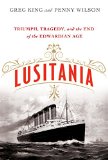Summary | Excerpt | Reviews | Beyond the Book | Read-Alikes | Genres & Themes | Author Bio

Triumph, Tragedy, and the End of the Edwardian Age
by Greg King, Penny WilsonThis article relates to Lusitania
 Greg King and Penny Wilson's Lusitania commemorates the 100th anniversary of the sinking of the great ship by exploring its glamorous passengers and the fateful torpedo that highlighted a microcosm of the elegant Edwardian era and possibly initiated the U.S. involvement in World War I (WWI).
Greg King and Penny Wilson's Lusitania commemorates the 100th anniversary of the sinking of the great ship by exploring its glamorous passengers and the fateful torpedo that highlighted a microcosm of the elegant Edwardian era and possibly initiated the U.S. involvement in World War I (WWI).
In 1915, after the beginning of WWI, a German U-boat torpedoed and sunk the RMS Lusitania, a British ocean liner. It was the 101st trip RMS Lusitania had made across the Atlantic Ocean. Its first trip was in 1907. More than 1100 people were killed. Why did this tragedy happen? And did it prompt the U.S. to get into the war?
 President Woodrow Wilson had pledged neutrality when the war began, and public opinion in the U.S. was in agreement. But soon, Germany's attempts to cut off trade with the British Isles started to affect the USA's interests. Then, in February 2015, German submarines started to attack ships on their way to and from Britain irrespective of nationality, and several US ships were damaged or sunk. Tensions between the US and Germany were mounting.
President Woodrow Wilson had pledged neutrality when the war began, and public opinion in the U.S. was in agreement. But soon, Germany's attempts to cut off trade with the British Isles started to affect the USA's interests. Then, in February 2015, German submarines started to attack ships on their way to and from Britain irrespective of nationality, and several US ships were damaged or sunk. Tensions between the US and Germany were mounting.
 In May 2015, some New York newspapers published warnings by the German Embassy to US citizens traveling on British (or any Allied) ships. The warnings were on the same page as an advertisement for the Lusitania, which would sail from New York to Britain soon. By this point in the war, many British merchant ships had been sunk by German submarines, but the consensus was that Lusitania was exceptionally fast, and so was the best way to travel. At the same time, the British Admiralty also offered a warning – this one to the ship's captain, but it went unheeded. In fact, the captain disregarded all safety precautions: he slowed down in the most dangerous waters (supposedly because of fog), he was too close to the shore, and he wasn't zigzagging, which was the prescribed method for avoiding submarines.
In May 2015, some New York newspapers published warnings by the German Embassy to US citizens traveling on British (or any Allied) ships. The warnings were on the same page as an advertisement for the Lusitania, which would sail from New York to Britain soon. By this point in the war, many British merchant ships had been sunk by German submarines, but the consensus was that Lusitania was exceptionally fast, and so was the best way to travel. At the same time, the British Admiralty also offered a warning – this one to the ship's captain, but it went unheeded. In fact, the captain disregarded all safety precautions: he slowed down in the most dangerous waters (supposedly because of fog), he was too close to the shore, and he wasn't zigzagging, which was the prescribed method for avoiding submarines.
And so, on May 7, 1915 at 2:12 p.m, the mighty Lusitania was hit by a torpedo. Coal dust was kicked up and when that combined with oxygen and flame, this produced a second explosion, which ripped open the starboard side of the ship's hull. Lusitania didn't have a chance – it sank. Among the more than 1200 people on board, more than 100 were Americans. Public opinion in America shifted. On April 4, 1915, the U.S. Senate voted to declare war on Germany. The House of Representatives agreed two days later and, thus, the United States entered WWI.
Lusitania entering NYC on its maiden voyage, courtesy of Sandpiper
The First Class Dining Room of RMS Lusitania, courtesy of Bonjour LaLaLa
The Official Warning issued by the German Embassy, courtesy of wikipedia
Filed under People, Eras & Events
![]() This "beyond the book article" relates to Lusitania. It originally ran in March 2015 and has been updated for the
April 2016 paperback edition.
Go to magazine.
This "beyond the book article" relates to Lusitania. It originally ran in March 2015 and has been updated for the
April 2016 paperback edition.
Go to magazine.
Your guide toexceptional books
BookBrowse seeks out and recommends the best in contemporary fiction and nonfiction—books that not only engage and entertain but also deepen our understanding of ourselves and the world around us.